The street with 18 betting shops
- Published
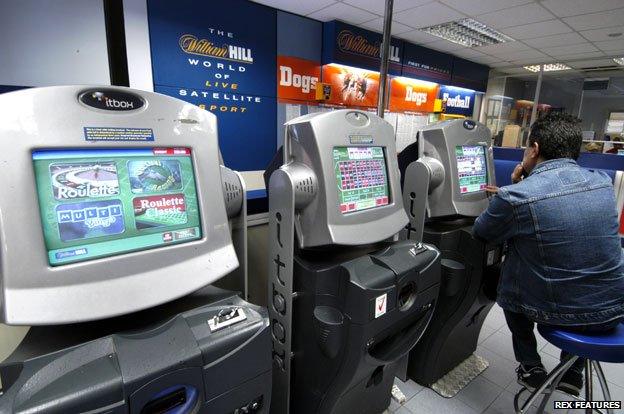
Fixed odds betting terminals, a kind of big-money fruit machine, are driving the profits in betting shops. Some councils are now fighting back.
Alongside the open fronted butcher's shops and brightly coloured silk houses, the bookmakers lining High Street North don't draw the eye by comparison.
Inside, the laminate floors and faint whiff of disinfectant underwhelm the senses, and no-one appears to be having much fun. The Las Vegas strip this is not.
Local councillors say the street in Newham, east London, has more bookmakers than any other in the country - 18 in total - and 80 in the borough as a whole.
In most of them, attention isn't focused on the horse or greyhound racing which streams as usual on to a row of televisions. Instead, gamblers crowd around four dark grey machines where they pick from a handful of fixed-odds games.
"Rainbow Riches", "Dragon's Flame" and "Star Wars: A New Hope" look like replicas of pub fruit machines, but Video Roulette looks to be the biggest draw.
Punters sit mesmerised on bar stools tapping bets on to the digitised green felt before watching the ball loop around the wheel and land with a synthetic clunk.
"It's the speed of the games that's so alarming," says Councillor Ian Corbett, who repeats the familiar charge: "It's the crack cocaine of gambling".
He says the machines average profits of around £50,000 each a year - £200,000 per shop. Market research firm Mintel says their revenue surpassed traditional over the counter betting for the first time in 2011/12.
Unlike traditional amusement arcades - which are in the minority in Newham - there are no neon bulbs, no sounds to signal a jackpot, and no rush of falling coins. These would slow people down, says Corbett. Once banknotes have been fed into the machine, everything takes place on the screen. Winners cash out by printing paper slips and trading them in with the shop attendant.
Newham council has just lost a legal battle to prevent a new Paddy Power opening in nearby Green Street. There too, the road is already peppered with gambling shops - three branches of Ladbrokes sit within a few metres of each other just outside the station.
Bookmakers are limited to four fixed-odds machines per shop. With machines bringing in on average £900 a week in profits, critics say some bookmakers seem to be avoiding the restriction by opening more branches, creating High Street clusters.
But the bookmakers point out that the actual number of betting shops nationwide has remained fairly static for a decade and is half what it was in the 1970s. Ladbrokes say shop relocations to the High Street are simply responding to demand.
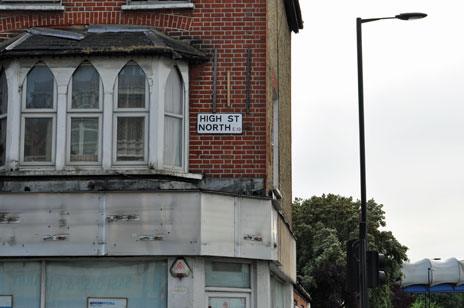
High Street North, London E12 - home to 18 betting shops including...
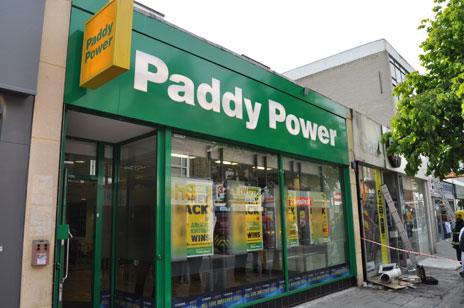
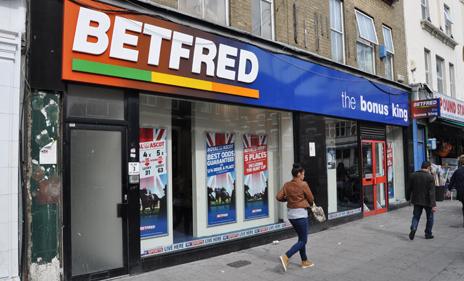
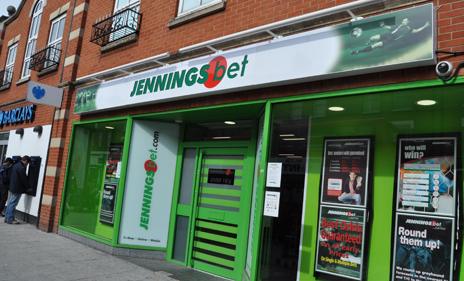
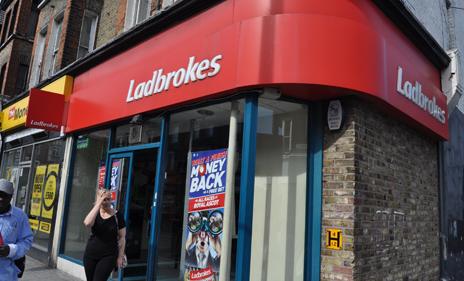
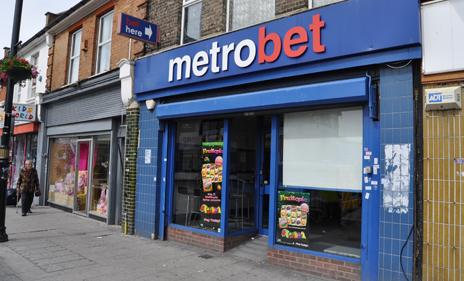
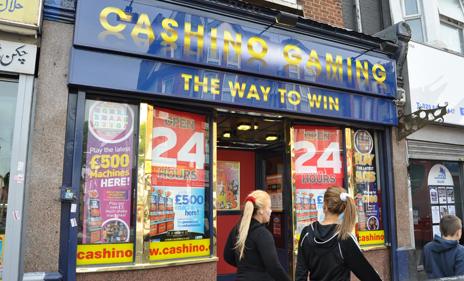
... and some amusement arcades
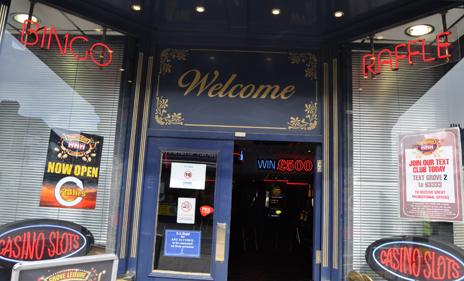
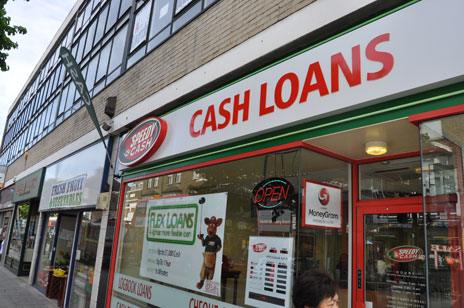
... and more than one payday loan company.
Yakub Wadiwala is representative of a mosque on Green Street, near West Ham's stadium. The mosque is opposite a betting shop.
They aren't welcomed by most people, he says. "We organised a petition against [a] Paddy Power shop and collected hundreds of signatures, but the council couldn't do anything about it."
Kais Abid works in a nearby garment shop. "It's pretty shameful. A Paddy Power shop isn't the first thing you want to see every time you've finished praying."
Newham isn't the only council concerned about the proliferation of betting shops.
Haringey in north London - which has 11 betting shops in Tottenham High Road alone - says it has tried "several avenues", external to try to beat the boom.
Medway Council, in Kent, has invited bookmakers, bingo halls and amusement arcades to help draw up a voluntary code on gambling.
And in May, the Local Government Association warned new planning rules - which allow owners of certain premises to change use without applying for permission - could lead to English High Streets being overrun by betting shops and payday lenders.
The fixed-odds machines allow players to stake up to £100 on a 20-second spin of the wheel.
"About 52% of betting shop profits and 83% of their turnover is derived from FOBTs, so they are attractive for betting shops," says Matt Zarb-Cousin, a spokesman for the Campaign for Fairer Gambling.
"But the primary activity on FOBTs is gaming [a wager on an event on the premises] rather than betting [where the action is elsewhere], so we believe they are in breach of betting licences, and the Gambling Commission should step in and stop these shops from opening."
The campaign believes poorer areas, with high levels of unemployment, are being targeted by betting shop chains.
The Association of British Bookmakers denies this, saying it's "offensive", and like retail units, bookmakers simply respond to demand.
Stats from the charity GamCare, external, the national charity for people struggling with problem gambling, show FOBTs are the second most frequently mentioned gambling activity by clients.
Zarb-Cousin points to a survey carried out in Newham which suggests that 87% of FOBT users find the machines addictive, and 76% spend more than they plan to.
In a cafe just off Green Street, a sixth-form student agrees that the community has a problem. "My cousins, my uncles, my brothers - they all gamble and it's a big issue," says Atika Akhtar.
"It causes a lot of fights - I know because it's happening in my own family. People get into debt and things get messed up. They become addicted."
But Adrian Scarfe, head of clinical training at GamCare, thinks most people are overreacting.
"The British Gambling Prevalence Survey 2011, external showed a relatively low rate of gambling on FOBTs although there was a higher presence of problem gambling among FOBT players compared to that found among the adult population," he says. The survey showed 4% of people had used FOBTs, up from 3% in 2007.
The association between FOBTs and problem gambling is patchy. The Gambling Commission says that if there are causal links, they are poorly understood. Ladbrokes says there is no evidence machines are any more of a problem than any other gambling product.
Zarb-Cousin thinks that the risks could be mitigated by capping the maximum stake at £2 instead of £100, where it is now.
Another suggestion is to set simple player protections to limit the amount of time and money vulnerable people spend at the machines, according to Mark Griffiths, professor of gambling studies at Nottingham Trent University.
On High Street North two gamblers wandering out of a Ladbrokes were happy to talk, but wouldn't give their names. Both are in their early 20s and from Hyderabad, south India.
"If our parents knew what we were doing they'd go crazy," says one. "We do respect their views, which is why we don't tell them."
You can follow the Magazine on Twitter, external and on Facebook, external